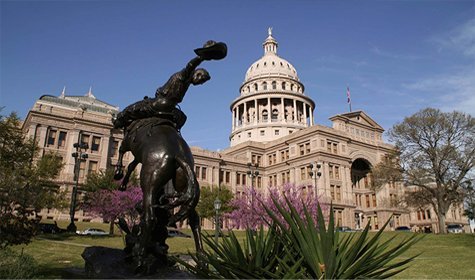AUSTIN, Texas – A Texas bill that would prohibit law enforcement from obtaining location data from electronic devices without a warrant in most cases, representing an important first step in addressing the growing federal surveillance state, passed out of committee Monday.
Rep. Bryan Hughes (R-Mineola) introduced House Bill 2263 (HB2263) on March 3. The legislation would require state and local law enforcement agencies to get a warrant before obtaining location data from an electronic device unless the device is reported stolen by the owner, there exists an immediate life-threatening situation, or if a law enforcement officer reasonably believes a fugitive with a felony arrest warrant issued possesses the device.
HB2263 also sets specific criteria law enforcement agencies must meet when applying for a warrant, limits the time a warrant remains active and sets stringent reporting requirements.
The bill passed out of the Criminal Jurisprudence Committee and will not move to the full House for consideration.
IMPACT ON FEDERAL PROGRAMS
HB2263 would not only limit the actions of state and local law enforcement in Texas, it would also represent an important first step in addressing the federal surveillance state. By requiring a warrant, the bill would prohibit state and local law enforcement agencies from “obtaining” warrantless data shared with them by federal agencies like the NSA.
Information released by Edward Snowden and other whistleblowers revealed the NSA tracks the physical location of people through their cellphones. In late 2013, the Washington Post reported that NSA is “gathering nearly 5 billion records a day on the whereabouts of cellphones around the world.” This includes location data on “tens of millions” of Americans each year – without a warrant.
We also know the NSA shares this information with state and local law enforcement. Reuters revealed the extent of such NSA data sharing in an August 2013 article. According to documents obtained by the news agency, the NSA passes information to police through a formerly secret DEA unit known Special Operations Divisions and the cases “rarely involve national security issues.” Almost all of the information involves regular criminal investigations, not terror-related investigations.
In other words, not only does the NSA collect and store this data, using it to build profiles. The agency encourages state and local law enforcement to violate the Fourth Amendment by making use of this information in their day-to-day investigations.
By prohibiting wholesale collection of location data without a warrant, HB2263 would also limit the amount of data available that could find its way into federal data bases.
As a result of the rapid evolution of information sharing, locally-gathered information doesn’t remain “local” for very long. With new intelligence sharing systems like these fusion centers, along with Joint Terrorism Task Forces and the ISE, information collected by local police in any city or small town in America can now quickly end up in federal intelligence databases. That means your information becomes accessible across the country with a click of a mouse.
The Tenth Amendment Center is a national think tank that works to preserve and protect the principles of strictly limited government through information, education, and activism. The center serves as a forum for the study and exploration of state and individual sovereignty issues, focusing primarily on the decentralization of federal government power as required by the Constitution. This article originally appeared at: http://blog.tenthamendmentcenter.com/2015/05/texas-bill-to-stop-cellphone-location-tracking-without-a-warrant-passes-house-committee/

